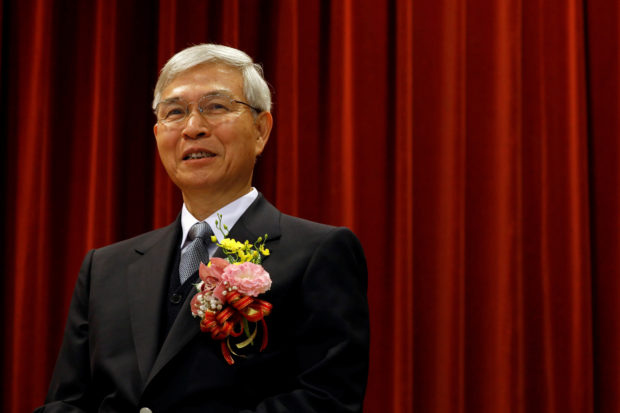
Central Bank Governor Yang Chin-long. REUTERS/Tyrone Siu/File photo
TAIPEI -Taiwan central bank governor Yang Chin-long said on Thursday there would be no foreign exchange controls during his tenure at the bank, adding management measures were sufficient to maintain market stability if there were large capital outflows.
Yang’s five-year term is due to expire early next year. He can be reappointed for a second term though there has been no confirmation either way.
The Taiwan dollar has, like other major Asian currencies, depreciated sharply in recent weeks due to aggressive U.S. interest rate increases and U.S. dollar strength as well as worries over slowing global economic growth.
It has lost 13 percent this year against the dollar.
Yang, taking lawmaker questions in parliament, said recent outflows of foreign capital were mainly due to U.S. interest rate rises and that he believed the United States would continue to push up interest rates until the end of this year.
“Foreign exchange control measures will not be implemented in the short term,” he said.
The central bank said on Wednesday it would not adopt foreign exchange control measures, issuing a statement after it said Yang’s comments in parliament earlier in the week had been misreported.
The currencies of South Korea and Japan, competitor exporters of Taiwan, have also sharply fallen but Yang told lawmakers that he did not want to see competitive devaluations.
He was also questioned about the future direction of rate rises, the central bank having last week raised the benchmark discount rate by 12.5 basis points to 1.625 percent.
Yang said the economy’s performance and inflation would be closely watched over the next three months – the next rate setting meeting is scheduled for mid-December – but added that inflation and gross domestic product (GDP) forecasts were “still very unstable”.
The central bank’s monetary policy response is “dynamic”, and the bank must be very cautious, he said.
The central bank last week trimmed its 2022 estimate for GDP growth to 3.51 percent from 3.75 percent seen in June.
It also said it expected the consumer price index (CPI) would rise by 2.95 percent in 2022, slightly revising up the outlook from 2.83 percent predicted in June.